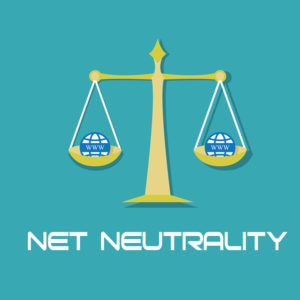California Gov. Jerry Brown just signed new net neutrality rules into law, making California the first state to publicly defy the Federal Communications Commission’s (FCC) decision to revoke Obama-era net neutrality rules and preempt states from enacting their own.
California’s move is symbolic. States don’t have the power to overrule federal regulators. But with the net neutrality debate still raging, Sunday’s symbolic act could lead to policy change — although not everyone thinks its likely.
Since the FCC, under the leadership of Trump appointee Ajit Pai, repealed net neutrality rules and preempted states from instating their own net neutrality rules, a flurry of lawsuits have followed from states and activist groups.
The most significant case to date, Mozilla v. FCC, will be heard by the D.C. Circuit Court of Appeals, but final briefs have not been submitted (the deadline is Nov. 27) and the first oral arguments have not been scheduled.
After Brown signed the law this weekend, the Department of Justice (DOJ) promptly filed a lawsuit against the state of California, demanding a preliminary injunction to prevent the law from going into effect until the D.C. Circuit Court decides Mozilla v. FCC.
The DOJ accuses California of trying to “subvert the Federal Government’s deregulatory approach” and called the law “an extreme and illegal state law attempting to frustrate federal policy.”
Allie Bohm, policy counsel for pro-net neutrality think tank Public Knowledge — which is one of the private petitioners in Mozilla v. FCC — said California’s new law is intended to send a message to the federal government. However, she also believes California’s law has a good chance at being upheld in court.
“What the FCC did was say hey, we don’t have authority over broadband providers to police net neutrality, we have no authority in this area, and by the way we’re going to preempt states from doing something in this area,” Bohm told InsideSources. “Typically if an agency wants to preempt something it’s because they’ve done something in that area. California is saying, you don’t have the authority to preempt us. You can’t both abdicate responsibility and preempt states at the same time.”
If the DOJ gets the preliminary injunction, she said, California’s law won’t go into effect. If the DOJ doesn’t get the preliminary injunction, the law will go into effect while both lawsuits pend.
“The point of the law is California wants to support California residents, and they have a stronger-than-frivolous argument because they have the authority to do so,” she said.
One of the major reasons for passing the law was to show the FCC that many people do care about net neutrality and are willing to fight for it.
“Californians who lobbied for this legislation as well as the legislators who authored it and worked hard for its passage do legitimately want to protect consumers in California,” she said. “It also has effects on the federal debate where we say, look, this entire state, which is a very populous state, thinks net neutrality is very important and is trying to protect its people.”
Roslyn Layton, a visiting fellow at the American Enterprise Institute (AEI) who specializes in telecommunications and internet policy, thinks California’s law sends a less idealistic, more opportunistic message.
“[California is] appealing to the emotion driven out of the act, not the act itself,” she told InsideSources. “They’re hoping they appeal to Millennials in that they’re standing up to Trump. This gives them tremendous opportunities to say, hey we’re socking it to the administration, and this will be a talking point for November. The sad part about it is, if you care about the rule of law, you should be concerned even if you are a Millennial. You want to have the rule of law to decide policy.”
Layton thinks California’s law won’t stand up in court, and she doesn’t think California will succeed in bringing net neutrality back.
“I think net neutrality’s days are numbered,” she said. “There’s been a last push, but even the internet companies … realize for them it’s not good business.”
According to Layton, the law doesn’t make sense given it is modeled after India’s net neutrality law, which she said has slowed deployment of internet access to Indians down to a trickle.
“[It’s] extremely harmful and has slowed the rate of adoption in India and blocks access for the poor,” she said. “It’s the most unfriendly consumer policy.”
Pro-net neutrality groups, on the other hand, are focused on how net neutrality rules stop big telecom companies from preying on consumers.
Fight for the Future, a grassroots pro-net neutrality group, issued this statement: “This victory in California is a testament to the power of the free and open Internet to defend itself. And it’s a beacon of hope for Internet users everywhere who are fighting for the basic right to express themselves and access information without cable and phone companies controlling what they can see and do online.”
Layton thinks the answer to tough policy debates shouldn’t be symbolic politics.
“California has major issues, but instead of getting real solutions, they’re getting fake policy,” Layton said. “You can make a meaningless policy but it’s enough to get them to vote for your party. And both parties do it.”

